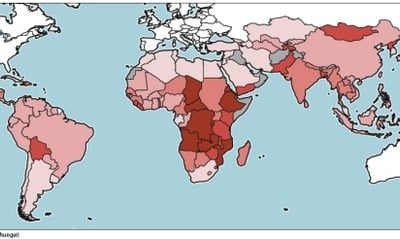Türkiye's Agricultural Potential and Modernization
Türkiye's agricultural potential faces challenges from the global food crisis due to outdated farming techniques and distribution inefficiencies. By investing in modernization, Türkiye can strengthen its agricultural sector and contribute to solve global food crisis.
POLICY BRIEFS
Mithat Direk
9/21/2024


The world faces a paradox when it comes to food production and distribution. Globally, agriculture produces enough food to sustain 25 billion people, yet nearly 1 billion individuals suffer from hunger. This stark contrast between abundance and scarcity is a symptom of the world’s unequal food distribution. In some regions, particularly in developed nations, overconsumption and obesity are rising problems, while in others, such as parts of Africa and Asia, people are struggling with malnutrition and food insecurity. This imbalance highlights not only the failures in food allocation but also the deep-seated structural problems in global agriculture and trade.


Türkiye, a nation with significant agricultural potential, is not immune to the global food crisis. Despite ranking high in the production of certain agricultural goods, it faces the looming threat of food insufficiency. Understanding Türkiye's position in the global food landscape involves examining its agricultural strengths, shortcomings, and the broader context of global food inequality.
The Global Hunger Crisis
A closer look at the global hunger map, as provided by the Food and Agriculture Organization (FAO), reveals a clear picture of food insecurity across many regions, particularly in Africa, parts of Asia, and South America. The countries suffering from extreme hunger are typically resource-rich but lack the technology, infrastructure, and financial systems necessary to capitalize on these resources. While the African continent is blessed with fertile land and abundant natural resources, it remains a hotbed of food insecurity due to underdeveloped agricultural practices, poor transportation systems, and political instability.
The global food crisis is also exacerbated by economic disparity. Wealthier nations with higher purchasing power can secure a surplus of food, while poorer countries are left to face the consequences of food scarcity. This discrepancy contributes to social unrest, as seen in the past when high food prices and shortages have triggered revolts, such as those that occurred during the Arab Spring in Tunisia. Food, unlike other resources, has a direct and emotional impact on people, driving them to rebellion when they feel they have been deprived of this basic necessity.
Türkiye’s Role in the Global Food Crisis
Türkiye’s position in the global food crisis is complex. On one hand, it ranks among the world’s top producers of several agricultural products, including hazelnuts, raisins, figs, and cherries. It boasts a strong agricultural sector that contributes significantly to its economy. In fact, Türkiye is ranked within the top ten producers of at least 25 different agricultural goods, which demonstrates its potential as a major agricultural power.
However, despite this production capability, Türkiye struggles with food insufficiency and falls short of capitalizing on its agricultural strengths. This disparity stems from its inability to modernize agricultural practices at the scale necessary for international trade competitiveness. While Türkiye is advanced in certain agricultural products, such as apples, it cannot effectively penetrate global markets due to the fragmented nature of its production. Unlike countries that employ large-scale farming to ensure mass production and uniformity, Türkiye’s agricultural sector is marked by small-scale, diverse farming, which limits its efficiency and market reach.
For instance, despite being a leader in apple production, Türkiye does not hold a strong position in the global apple trade. This is largely because it produces numerous varieties of apples in small quantities, which makes it difficult to scale up production for international export. In contrast, countries like the United States or China, which engage in large-scale, standardized farming, can dominate the global apple trade by producing a few varieties in massive quantities. This allows them to meet global demand consistently, a strategy that Türkiye has yet to fully implement.
Barriers to Modernization in Türkiye’s Agriculture
One of the key challenges that Türkiye faces in the agricultural sector is the lack of modernization and infrastructure to support large-scale farming and efficient food distribution. While the country has made some strides in adopting advanced agricultural techniques, such as improved irrigation systems and greenhouse farming, the overall pace of modernization has been slow.
Several factors contribute to this stagnation. Firstly, Türkiye’s agricultural sector is heavily reliant on small, family-run farms, which tend to be resistant to change and hesitant to adopt new technologies. These farms often lack the financial resources to invest in modern equipment, fertilizers, and seeds that could improve yields and reduce labor costs. As a result, productivity remains low compared to countries that have embraced industrialized farming practices.
Secondly, Türkiye’s agricultural trade policies have not evolved to match its production potential. While the government has provided incentives and subsidies to certain agricultural sectors, these efforts have not been enough to boost the country’s competitiveness in the global market. For instance, the Turkish government has offered incentives for the production of strategic crops like wheat, but these policies have not been consistently applied across all sectors, leading to uneven growth in agricultural productivity.
Additionally, the country faces significant logistical challenges. Poor transportation infrastructure, particularly in rural areas, makes it difficult to move agricultural products from farms to markets efficiently. This is a critical issue for a country like Türkiye, where the agricultural sector is spread across diverse geographic regions, from the Mediterranean to the Aegean and Anatolian highlands. Without efficient transport systems, farmers cannot get their goods to market quickly, leading to food waste and lost income.
Potential Solutions for Türkiye
To address these challenges and solidify its position as a global agricultural leader, Türkiye must focus on several key areas:
1. Modernizing Agriculture at Scale:
One of the most pressing needs is to shift from small-scale, fragmented farming to large-scale, industrialized agriculture. This would involve consolidating smaller farms into larger, more efficient operations capable of mass production. By adopting modern farming techniques—such as precision agriculture, which uses technology to optimize planting, watering, and harvesting—Türkiye could significantly increase its agricultural productivity.
2. Improving Infrastructure and Logistics:
Investment in transportation infrastructure is crucial for Türkiye to reduce food waste and improve its agricultural trade potential. This includes building better roads and storage facilities to ensure that food can be transported from rural areas to markets efficiently. Furthermore, improving access to modern storage technologies, such as cold storage for perishable goods, would help reduce post-harvest losses, which are a major issue in Türkiye’s agricultural sector.
3. Diversifying Agricultural Exports:
Türkiye already produces a wide variety of agricultural goods, but it needs to diversify its export markets to reduce its dependence on a few key trading partners. By expanding trade agreements with countries in Asia, Africa, and Latin America, Türkiye could tap into new markets for its agricultural products, helping to boost its economy and improve food security.
4. Strengthening Agricultural Research and Development:
Investing in research and development (R&D) for agriculture is critical for Türkiye to stay competitive in the global market. This includes developing new crop varieties that are more resilient to climate change and pests, as well as exploring sustainable farming practices that reduce environmental degradation. By focusing on R&D, Türkiye can position itself as a leader in agricultural innovation.
Türkiye’s Path Forward in Addressing Food Security
Although Türkiye has significant agricultural potential, it is still vulnerable to the global food crisis due to its slow adoption of modern farming techniques and inefficiencies in its food distribution systems. However, with the right investments in modernization, infrastructure, and trade policies, Türkiye has the opportunity to not only meet its own food security needs but also become a key player in the global agricultural market.
Addressing the food crisis requires a holistic approach that takes into account the complex interplay between production, distribution, and trade. By focusing on these areas, Türkiye can not only strengthen its agricultural sector but also contribute to solving the larger global issue of food inequality, ensuring that no one goes hungry in a world of abundance.
Please note that the views expressed in this article are of the author and do not necessarily reflect the views or policies of any organization.
Mithat Direk is serving the Department of Agricultural Economics, Selcuk University, Konya-Türkiye.
Related Stories
Reframe your inbox
Subscribe to our newsletter and never miss a story.
We care about your data in our privacy policy.
"The Agricultural Economist," your essential weekly guide to the latest trends, research, and insights in the world of agriculture and economics.
The Agricultural Economist © 2024
Published by The AgEcon Frontiers (TAEF)
All rights of 'The Agricultural Economist' are reserved with TAEF
